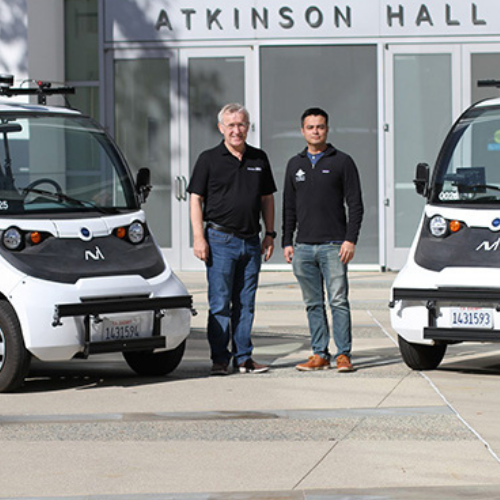
Excerpted from the story "7 AI-Powered Technologies You Should Know About" published on UC San Diego Today August 22, 2023
At UC San Diego, to catch a glimpse of the future, one needs only to look around. Here, research conducted in the Autonomous Vehicle Laboratory extends beyond the walls of a building and into the roads and walkways that weave throughout the university’s 1,200-acre campus. Self-driving golf carts making mail deliveries have become a common sight on campus since making their debut in 2019, and Henrik Christensen, who leads the lab’s research team and directs the UC San Diego Contextual Robotics Institute, says this project barely scratches the surface of how artificial intelligence could transform delivery and micro-transit logistics on campuses, in cities and beyond.
Using the same underlying AI algorithms they’ve developed for the mail delivery vehicles, which are programmed to obey traffic laws en route to their intended destination and to detect cars, bicycles or pedestrians along the way, Christensen’s team aims to start the roll-out of its next project this fall. This time, it’s three-wheeled scooters programmed to drive themselves to high-demand locations on campus at certain times of day. In the morning, for example, several scooters might be found at the central campus trolley station, ready for commuters to pick up and ride to class. After the user reaches their destination, the scooter will then drive itself back to wherever it’s needed.
According to Christensen, who is a distinguished professor of computer science in the Jacobs School of Engineering, developing AI algorithms that allow autonomous vehicles to safely navigate pedestrian-heavy routes like those found on university campuses presents an interesting research challenge. Self-driving technology that’s already commercialized can deftly handle highway travel, but dense urban environments remain a significant challenge.
“We’re trying to work on problems that the current self-driving companies have not yet solved,” Christensen said.

